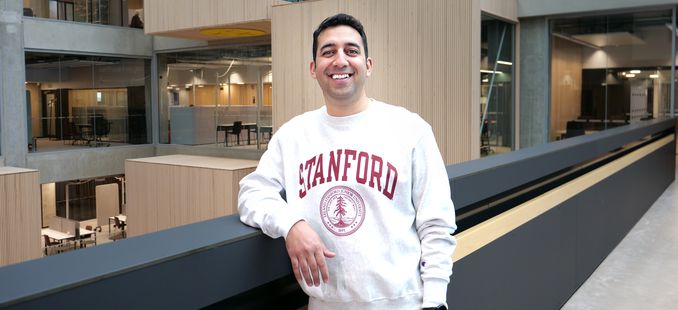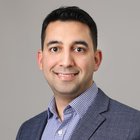
Principal lecturer Mojtaba Jafaritadi conducts artificial intelligence research at a top university - "At Stanford, there is a culture where you are encouraged to take smart risks"
Mojtaba Jafaritadi, artificial intelligence scientist and Principal Lecturer at Turku University of Applied Sciences, will start his second year of research fellowship at Stanford in September.
Text and photo: Siiri Welling
Working at the renowned Stanford University in California, USA, had long been the dream of Mojtaba Jafaritadi, head teacher of artificial intelligence at the Turku University of Applied Sciences. However, it took a little longer for the dream to come true than Jafaritadi could initially imagine, thanks to the corona pandemic.
– The whole process started already in 2018. Then I visited Stanford University and talked with the professors about the possibility of doing research at Stanford. The professors also helped me draft the application, says Jafaritadi.
Jafaritadi was able to leave for California only in the spring of 2021. He worked as part of a team of top researchers and developed signal processing and artificial intelligence tools used in a dedicated brain imaging system to improve the quality of the images in Positron Emission Tomography.
– I worked as part of Stanford's Molecular Imaging Program, or MIPS. The program operates under medical education, and in the program's laboratory we develop molecular imaging devices in more detail, says Jafaritadi.
The project is complex and involves a lot of research and testing with devices. The research lasted a year, and Jafaritadi returned to Turku in the spring of 2022. However, working at Stanford was interesting enough that Jafaritadi will be seen at Stanford again. He received new research funding from the Finnish Cultural Foundation and Stanford Cancer Institute. Research at Stanford is again one year long, and during it, previous research continues, where artificial intelligence tools are developed to help diagnose Prostate Cancer.
– But at the same time, we are also developing another device that helps identify head and neck cancers. This imaging method is supposed to help especially patients who are at risk of developing cancer again. Let's say, for example, that a patient cured of cancer comes for a check-up visit. In the images taken of him, the human eye cannot detect new cancer if the cancer is only in a very early stage. Recurring cancer detected later affects the treatment the patient receives. But what if artificial intelligence could detect renewed cancers even before the human eye can detect them, asks Jafaritadi.
Close ties to Silicon Valley
Jafaritadi hopes that the study will be completed within the year. However, Stanford's culture is different, and research can take a while.
– Stanford has a culture where people want to take smart risks. Researchers are idealists, and they are particularly interested of the impact of the research. I like that way of thinking and working, and I am looking forward to being a part of that culture again.
Stanford University also has very close relations with the nearby Silicon Valley. In the heart of American technology, there are many researchers, professors, and companies who, in addition to their own business activities, are constantly looking for new. CEOs and financiers are ready to help commercialize good innovations.
– Entrepreneurial culture is part of Stanford. Many successful entrepreneurs live in the Bay area, who later financed other high-tech projects, says Jafaritadi.
The commercialization of innovations is also of interest to Jafaritadi, although teaching and artificial intelligence research will continue to be part of Jafaritadi's future. The work at Turku University of Applied Sciences will not be completely interrupted during the Stanford exchange, as Jafaritadi is closely involved in the PRIVASA project . In it, artificial intelligence methods are developed to help in the safe and private utilization of sensitive health data.
– I try to participate in PRIVASA's meetings at the end of my own research day. So sometimes the days can be long.
Never give up
Jafaritadi became interested in artificial intelligence and its possibilities about fourteen years ago. He initially studied biomedical engineering in Iran, before applying for a master's degree at Åbo Akademi. The interest towards AI came from a need.
– In general, it is possible to use classic solutions to solve a problem, I have used these in my masters and PhD thesis. But after that I concluded that I need even smarter tools to solve such complex problems. I took many of Stanford's courses on artificial intelligence, and that is where it all started. Artificial intelligence is a very rapidly developing field, and it can be used in many different areas of expertise, says Jafaritadi.
In his career and especially at Stanford, Jafaritadi has learned to never give up.
– At Stanford, I learned to look at things from different perspectives. Sometimes research can fail, but you should never give up.
Get to know the research group!
Mojtaba Jafaritadi works at the Health Technology research group.
